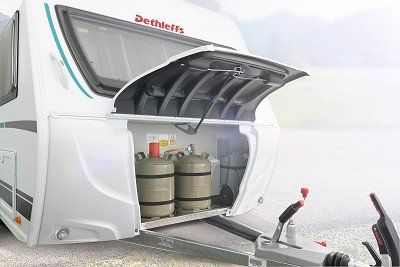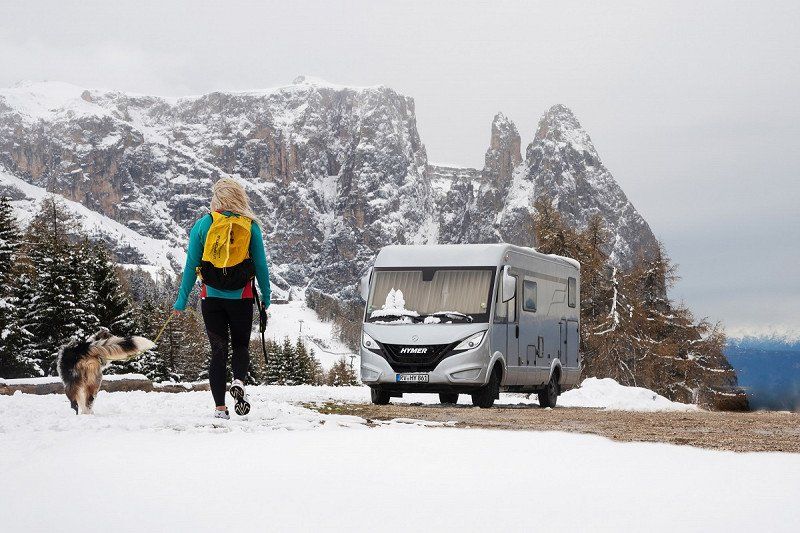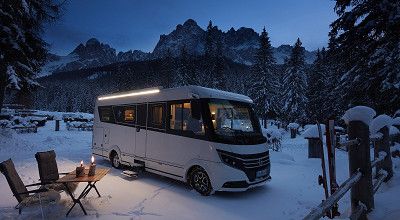How and what you prepare for your camping trip will depend on what time of the year you're going camping. You will usually want to know how long your gas supplies will last in your motorhome or how much gas you will use for heating your campervan when caravanning from autumn to spring, more so in winter. Freeontour reveals how to calculate gas consumption in your camping vehicle and which factors you have to consider.
Contents
Why is there no general information on gas consumption in camping vehicles?
Which factors influence gas consumption in a motorhome or caravan?
How do you calculate expected gas consumption in a motorhome or caravan without empirical data?
How do you calculate expected gas consumption in a motorhome or caravan with empirical data?
How do you calculate the number of days that an 11 kg gas bottle will last?

Why is there no general information on gas consumption in camping vehicles?
To get a rough idea of how long you can get by with an 11 kg gas bottle in a motorhome or caravan, camping novices can use the experience of other campers as a guide. Camping websites and forums often cite values of between 20 and 30 days for summer, but sometimes you will also read two months or more, whereas in winter a gas bottle tends to run out after two to three days for some campers, and after one or two weeks for others. This may seem contradictory, but many external factors influence gas consumption, such as outside temperature, destination, choice of pitch, type of gas appliances and camping vehicle size.
However, your own gas usage also has a direct impact on gas consumption. Taking all these points into consideration, it becomes pretty clear why every camper needs to calculate the amount of gas they expect to use before taking a longer trip abroad or going winter camping to ensure that they do not run out of gas. Freeontour explains how to go about this.

Which factors influence gas consumption in a motorhome or caravan?
First and foremost, there is one essential and obvious factor when it comes to gas consumption: the outside temperature and in turn the destination. In other words, if you go winter camping in the snow, you will use the heater more often to make the temperature inside your motorhome or caravan more pleasant. However, when it's hot outside you will use less heating or none at all, but the refrigerator will need more power to keep your food and drinks cold. It should be noted that a refrigerator usually requires far less gas than a heater, even when running at full capacity.

By way of comparison: a modern refrigerator in a motorhome consumes around 14 to 20 g of gas per hour at full power, while a heater consumes around 150 to 500 g of gas per hour. These figures point to the next variable and important factor: the efficiency and type of gas appliances in your motorhome or caravan. The output of every device, which you can find in the manufacturer's documentation, will vary depending on the manufacturer, product line and age. Moreover, some refrigerators, space heaters and water heaters only use gas as an energy source, whereas hybrid devices can be operated with gas and shore power. Hybrid gas/diesel heaters can also be used for keeping motorhomes and campervans warm.

Then your own camping behaviour comes into play: do you like staying at campsites or RV sites with a good infrastructure and use their shore power and sanitary facilities or do you prefer simple natural sites and a shower in your own camper? This is decisive when it comes to hot water consumption and, if using a hybrid device, even to heating. Your cooking behaviour also affects gas consumption: if you normally use the gas cooker to make tea or coffee in the morning but prefer dining in restaurants in the evening, you will use significantly less gas than, for instance, a family of four who also cooks dinner in their caravan. But obviously the most important question in winter is: how warm do you want it to be in your motorhome or caravan? Do you feel comfortable when the temperature is around 20 °C or do you prefer a cosy 23 to 24 °C?
The size of your motorhome, campervan or caravan and the number of people staying in it will also have an impact on gas consumption. It also matters how well insulated it is as the insulation properties of your camping vehicle influence the amount of gas you consume for heating.

How do you calculate expected gas consumption in a motorhome or caravan without empirical data?
As a camping novice, if you want to roughly calculate gas consumption in your motorhome or caravan, first make a list of all gas appliances in your motorhome and write down their consumption taken from the manufacturers' documentation, which is usually stated in grammes per hour (g/h). However, since devices such as gas cookers, hot water boilers, grills and ovens are rarely used for hours at a time in practice, it's best to convert the manufacturers' values directly into grammes per minute (g/min) and note them down in your list as well – simply divide the consumption (g/h) by 60 minutes per hour.
Example for an appliance consuming 150 g/h: 150 g/h ÷ 60 = 2.5 g/min

So that's the formula. You then estimate your own usage. Take your list and write down the average number of minutes per day that you use your gas appliances, e.g. for cooking, washing hands, brushing teeth, showering, heating, for the refrigerator, etc. It's also important to know whether you can switch them over to shore power or not.
Once you have all these figures, you can start your calculation. For each appliance, multiply the consumption per minute (g/min) by the daily operating time in minutes. Add up the results of all your devices and you will get the expected daily gas consumption in grammes for your motorhome.
Please note: consumption calculated in this way simply gives an approximate indication of maximum consumption, provided that you have correctly assessed your usage. It is primarily a rough guide to make it easier for you to plan the number of gas cylinders you may need and whether you will have to possibly exchange them during your getaway.
Our tip: if you do not have access to the manufacturer's documentation because your vehicle is older or you bought it second-hand, you can use the connected load, which is usually found on the type plate on the gas appliance in kW, to calculate the consumption of your gas appliances. Simply divide the connection value by the heating value of the gas used in the gas bottle (propane: 12.87 kWh/kg, butane: 12.69 kWh/kg).
Example of a 2.5 kW unit with propane gas: 2.5 kW ÷ 12.87 kWh/kg = 0.19 kg/h = 190 g/h

How do you calculate expected gas consumption in a motorhome or caravan with empirical data?
Calculating gas consumption without empirical data only gives you a rough idea of how much gas you can expect to consume in your motorhome or caravan. Another calculating method is a little more precise – observe and note down your use of the gas appliances in your camper during a camping holiday or a motorhome trip for several days. Instead of estimating usage, this will give you a better indication of your consumption as it also takes into account the size and insulating properties of your vehicle as well as your heating behaviour for maintaining a cosy temperature inside, especially in winter.
This is a slightly more complex way of calculating gas consumption, but it's worth it in the long run. If you do this for every season or with different outside temperatures, you will be able to estimate your gas consumption for future trips and holidays relatively accurately.

How do you calculate the number of days that an 11 kg gas bottle will last?
You can easily calculate how long a full 11 kg gas bottle will last for your needs. A gas bottle contains 11 kg of liquid gas, which usually consists of propane gas. However, to calculate how many days a bottle will last, you first have to convert the calculated daily consumption in grammes into kilogrammes.
Example based on a calculated daily consumption of 500 g: 500 g ÷ 1,000 g/kg = 0.5 kg
If you take a full gas bottle as the basis for your calculation, you will end up with the following results: 11 kg ÷ 0.5 kg/day = 22 days
Therefore, if your daily gas consumption is 500 g, then an 11 kg gas bottle should last 22 days.
If the gas bottle is no longer full, you will first have to determine the fill level by either using a fill level indicator or a scale.
Please note: even if you calculate the amount of gas that you expect to consume, you should still check the gas level regularly, especially in winter. After all, outside temperatures and user behaviour can vary from day to day and influence consumption.

















